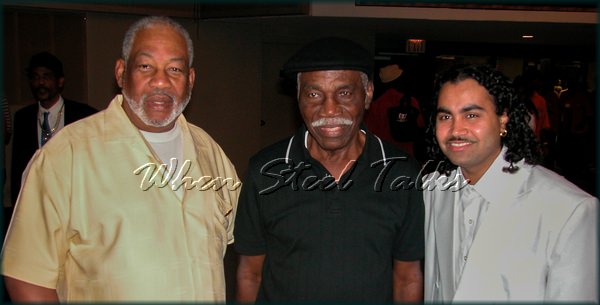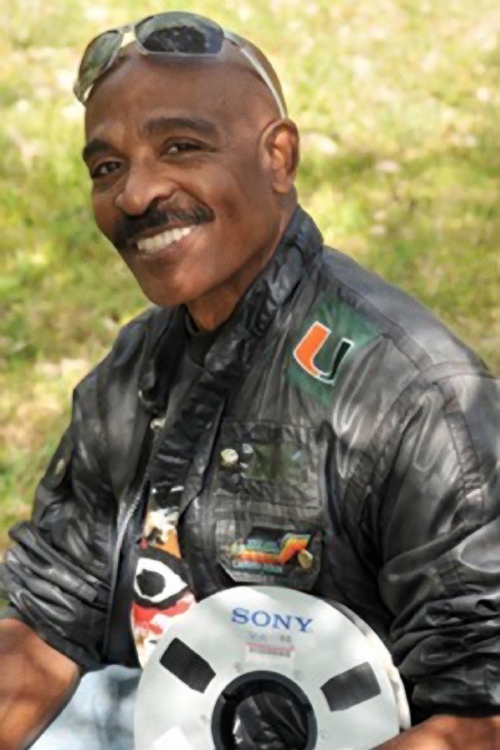
Elliot “Ellie” Mannette at WST
I surmise that in the age of early Pan on the Road, whenever Ellie Mannette awoke at his home in Trinidad, his morning prayer would be answered right on time.
That behind the distant hills of Laventille comes the promise of the sun.
No doubt, Ellie, a hallmark of power and leadership during Invaders’ glory years in the 1950s and 1960s, found out what he needed for happiness — the magic of thinking big and believing in himself.
As a self-promoter, it must have been quite a chore, choosing to be a special type of person. A genius who put the needs of others behind his.
To some, such revelation would encourage the worst traits in human nature - naysayers trying to cast gloom, spilling snobbery and vanity.
That Mannette, whose hard work and unstinting generosity generated from the sound of his band’s instruments — what with supporters selling the music as harps of gold — none of the clan responsible for burning and sinking the drums had ever challenged him, as far as I know.

“Happy” Williams - on bass with Frankie McIntosh, Garvin Blake, and Etienne Charles
“He was busy exploring and experimenting,” says [David] “Happy” Williams, a double second player with Invaders for four years before leaving home at 15 to become a bassist in New York.
The panyard opposite the Oval, too, concentrated on the day’s activity:
Ellie’s brother, Vernon, worked on sinking the face of the drums.

Emmanuel “Jack” Riley and Ellie Mannette
Emmanuel “Jack” Riley, a cigarette on his lip, an eye open, the other squinting as he burned and sinked the drums.
Zephyrine, a player with cachet, whom band members admired, as he formed augmented chords, testing a hypothesis, an experiment designed whether what he’s looking for is true —so much so that his spirit, and his name, too, would forever answer to “augmented.”

Elliot “Ellie” Mannette at WST
“Everybody was busy,” “Happy” remembers. “We respected these guys. Invaders had a clean sound, way above that of other bands.”
As bandleader, Ellie didn't say much. A chip off the old block, he was just as cool as his father, Pappy, a venerable soul at 106 years old.
You could tell. Ellie never raised his voice, even as badjohns in the panyard opposite The Oval would cuss for some reason or other.
His mother, La La, though, still exudes a fiery emotion and spirit, “Happy” admits.
Ellie would be fiery, too. In a way.
At times, it can feel as if your sacrifices and selflessness go unrecognized.
But Ellie was different.

Ellie Mannette demonstrates the science of his latest instruments at WST’s workshop in Brooklyn
“Ellie had an idea of what the pans could sound like,” says Dr. Shannon Dudley, associate professor of Ethnomusicology at the University of Washington in Seattle.
Dudley met Ellie when he came to Oberlin College in Ohio to tune pans for Jimmy Layden, an American who in turn taught kids to play pan.

Elliot “Ellie” Mannette
Dudley is author of Music from Behind the Bridge; Steelband Spirit and Politics in Trinidad and Tobago (2008), Carnival Music in Trinidad: Experiencing Music, Expressing Culture (2003), and assorted articles on Caribbean music.
Dudley was a “pan man” galore. He lived in Trinidad from 1992-93, played Pan with Phase II and Hummingbirds Pan Groove, music arranged by Ray Holman.
Hear Dudley.
“Ellie had the sound in his head and wanted Pan to sound the way he had it in his head.
“He’d say, ‘I still don’t have it sounding like I want it.”
“Ellie was never satisfied.
“He’d boast about himself as the greatest tuner.

Navy Steel Band on the roof of the Caribe Hilton in San Juan, Puerto Rico
“Ellie was willing to share and teach people his tuning secret. He did so with the US Navy Steel Band.”
In 1991 Ellie founded the University Tuning Project at West Virginia University, in Morgantown, a business that continues to operate even after his passing. Anyone who wanted to tune a pan well had to devote himself to the art. Ellie’s sun was popping up literally everywhere. It was coming up over the hill in Laventille.
“Trinidadians have a deeper relationship to the instrument,” Dudley admits. “It means something to them, their own culture.
“Internationally, it’s going to be different.
Panorama’s all-consuming popularity.
Ellie did more than anyone else to spread the popularity of the island’s music.
“A powerful life force,” is how Dudley regales Mannette.
“Nice that he passed suddenly. Not bedridden. He was a real character, a true artist who followed his vision. One of a kind crazy innovator, engaging and genuine. Love to talk Pan and share his knowledge with everyone. His generosity really helped to spread the popularity.”

Clifford Alexis with Neville Jules and Liam Teague
Still, Dr. Cliff Alexis, recipient of the Chaconia Medal, ponders over how Ellie figured out the convex to concave switch of the drum face.
“By then, myself and Bertie Marshall were working on partials and harmonics,” Dr. Alexis recalls.
Panologist Khalick Hewitt, a member of City Syncopators, respects Ellie not only as an innovator but also as a scientist of Pan.
“Ellie worked in the Foundry,” according to Hewitt, “so he understood metal. He studied metal. The tone of his pans was better than anyone else’s, and he had the upper hand on Neville Jules and other tuners.”
Not anymore. Tuners abound in the land of Ellie Man.
That’s his legacy.

Rudolph Charles
The late Rudolph Charles of Desperadoes, sitting in a chair nursing his wounded leg at his home in Los Angeles said that at least four tuners including himself and others from Invaders and Highlanders would turn his band into a radically new dimension. The Hammer thought he had nailed it down.
Ellie Man circumvented his hometown and followed his dream to take Pan to the States.
And around the world, too, with Andy Narell and their shared experiments that most certainly will revolutionize the instruments to a higher and sustained level.
Ellie Man hasn’t gone anywhere.
Mr. Mannette is resting in peace, for now.
Last Word:
Ellie Man, you’ve been constantly doing things for other
tuners and panists— You may have wished happiness for those people in your life. And though their happiness was just as important to them, your happiness was important as well.
You deserve to receive the same love you put out in Pan.
You deserve the world.

Ellie Mannette
Dalton Narine joined Trinidad All Stars as a teenage tenor panist in 1959. His father threatened to beat him up if he caught him playing the instrument, but Narine soldiered on and his dad gave in.

Dalton Narine joins Trinidad All Stars as a teenager, rehearses the Band’s 1959 Bomb, Intermezzo, in the garret of the Maple Leaf Club on Charlotte Street.

Dalton Narine is an award-winning writer and documentary filmmaker. He migrated to the United States and has worked as a journalist and as a writer for the New York’s Village Voice, Ebony, the Fort Lauderdale Sun-Sentinel, and an editor for The Miami Herald. Narine, who suffers from Post Traumatic Stress Disorder, is a decorated veteran of the American war in Vietnam.
Dalton Narine watched a movie among friends and was harassed for watching the credits roll. He was 12. They laughed at his quip that someday his name would be scrolling like that on a movie screen somewhere. Little did they know it was a prescient warning.
A similar scene played when Narine stopped learning the piano and walked into a panyard. Nobody believed him until they saw him playing classical music on pan on J’Ouvert. Eventually Narine co-founded the iconic PAN magazine and became senior editor.
Narine, an award-winning writer for two newspapers and a magazine, started working on a novel. But the chair of Columbia University film school steered him toward a screenplay instead. Your story is a movie, the professor said. Today Narine is working on his final draft, with two more screenplays in his head.
contact Dalton Narine at: narain67@gmail.com



 When
Steel Talks shirts
When
Steel Talks shirts